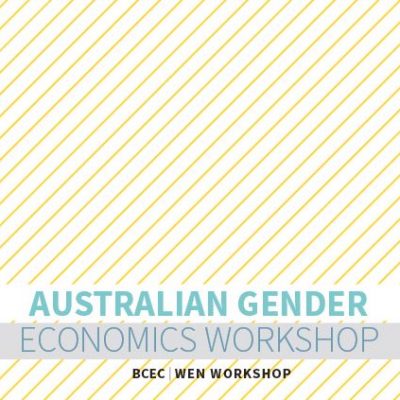Australian Gender Economics Workshop (AGEW)

46-54 Marine Terrace,
Fremantle WA
The Bankwest Curtin Economics Centre (BCEC) at Curtin University, together with the Economic Society of Australia’s Women in Economics Network (WEN) are pleased to announce the Australian Gender Economics Workshop.
We are also delighted to confirm our keynote speakers: Professor Alison Booth (Australian National University) and Associate Professor Betsey Stevenson (University of Michigan).
While substantial progress toward gender equity has been made over the past decades, key gaps in various life aspects relating to family, education, employment, wealth, security, voice and agency remain. There is a need for new insights to better understand the role and impact of gender on all economic and social domains, and to translate these insights into actions. The workshop aims to help fill this gap.
This workshop will provide researchers with a forum for presenting and discussing innovative research incorporating gender analysis in all areas of economics. Priority will be given to sessions that can inform policy-relevant questions.
The workshop will include a special policy session involving senior influencers from government, research, industry and not-for-profit communities. The purpose of this session is to draw research insights from the workshop together in ways that will actively shape policies to enhance the status of women across the full spectrum of economic and social outcomes.
View booking information and accommodation details.
Keynote Session – Thursday 8 February
Competitive behaviour in Economics: How different are men and women?
Alison Booth, Professor, Australian National University
Keynote Session – Friday 9 February
Gender representation in economics textbooks and what it means for inclusivity in the classroom
Betsey Stevenson, Associate Professor, Michigan University
Session 1A GENDER AND HUMAN CAPITAL
Gender differences in educational aspirations and attitudes
Tina Rampino, University of Queensland
Financial literacy and gender gaps: Evidence from Australia
Alison Preston, University of Western Australia; Robert Wright, University of Strathclyde
Labour market implications of promoting women’s participation in STEM in Australia
Michael Dockery, Curtin University; Sherry Bawa, Curtin University
Session 1B GENDER AND NON-COGNITIVE CHARACTERISTICS
How do differences in men’s and women’s personality profiles affect their job promotion prospects?
Leonora Risse, RMIT University
Gender differences in competitiveness and risk-taking among children, teenagers, and college students: Evidence from Jeopardy!
Michael Jetter, University of Western Austrtalia; Dr Jay K Walker, Old Dominion University
The importance of self-confidence in explaining subject choices in high school
Benoît Rapoport, Centre d’Economie de la Sorbonne, University Paris 1 – Panthéon Sorbonne & Institut National d’Etudes Démographiques (INED), France; Claire Thibout, Melbourne Institute
Session 2A GENDER PAY GAPS IN LABOUR MARKET OUTCOMES
Why do women leave computer science and information technology jobs?
Donna K Ginther, University of Kansas; Dr Joshua L Rosenbloom, Iowa State University
The evolution of the gender pay gap in Australia: Do young women now have the advantage?
Rebecca Cassells, Curtin University; Anne Daly, University of Canberra; Alan Duncan, Curtin University
Digitalisation and the labour force gender participation gap in the Indo-Pacific
Timothy Watson, Department of the Prime Minister and Cabinet; Dr Michael Corliss, Policy Adviser, Economic Policy Branch, Department of the Prime Minister and Cabinet; Michelle Le, G20 and Economic Policy Branch, Department of the Prime Minister and Cabinet
Session 2B GENDER AND LEADERSHIP
Leadership and gender discrimination: Experimental evidence from Ethiopia
Shibiru Ayalew, Seoul National University; Shanthi Manian, Washington State University; Ketki Sheth, University of California
How do gender quotas affect hierarchical relationships? Complementary evidence from a representative survey and labor market experiments
Edwin Ip, Monash University; Andreas Leibbrandt, Monash University; Joseph Vecci, University of Gothenburg
A policy paradox? Evaluating a target for gender diversity in corporate Australia
Rachel Power, University of Technology Sydney
Session 3A CULTURE, IDENTITY AND BEHAVIOUR
It’s raining men! Hallelujah? The long-run consequences of male-biased sex ratios
Pauline Grosjean, University of New South Wales; Rose Khattar, Office of Senator Deborah O’Neill
Labour markets, behavioural norms and identity
James Ottaway, Department of the Prime Minister and Cabinet
Self-promotion, stereotypes and gender inequality: Breaking the shackles of modesty
Julio Mancuso Tradenta, LaTrobe University; Ananta Neelim, RMIT University
Session 3B GENDER AND SOCIAL JUSTICE
Markets and exchange of mother’s milk — implications and regulatory approaches
Julie Smith, Australian National University
The tsunami that we can stop: The feminisation of poverty in Australia
Sue Ash AO, State Emergency Management Committee; Kelly Bruce, KB West Advisory
Gender economics and the human services – pricing virtue
Jay Martin, KPMG
Session 4A GENDER GAPS IN RETIREMENT INCOME
Gender and superannuation in Australia: An historical overview
Emily Millane, Australian National University
Analysis of superannuation for couples using tax data
Michelle Fairbain, Australian Treasury
What’s the best way to close the gender gap in retirement incomes?
Brendan Coates, Grattan Institute
SESSION 4B EVALUATION OF POLICIES
Parental leave regulations are a central element of family policies in most OECD countries
Elena Del Rey, University of Girona; Maria Racionero, Australian National University; Jose I. Silva, University of Girona
Expansions in paid maternity leave coverage and women’s labour market outcomes
Salma Ahmed, Deakin University
The effect of changing financial incentives in the family on youth outcomes
Agne Suziedelyte, City, University of London; Anna Zhu, Melbourne Institute
SESSION 5A GENDER IN DEVELOPING COUNTRIES
Impacts of hosting refugees on fertility of natives
Chiara Kofol, University of Bonn; Maryam Naghsh Nejad, IZA; Isabel Ruiz, University of Oxford
Sticky floors in developing countries – a distributional analysis of the formal and informal sector
Lisa Cameron, IZA; Diana Contreras Suárez, Melbourne Institute
Gender, consumption, and poverty in post-war Sri Lanka
Maneka Jayasinghe, Griffith University; Christine Smith, Griffith University; Shyama Ratnasiri, Griffith
University; Andreas Chai, Griffith University
SESSION 5B ECONOMICS OF THE HOUSEHOLD
Daughters and divorce
Jan Kabatek, Melbourne Institute; David C. Ribar, University of Melbourne
The effect of gender wage differentials and women’s bargaining power on aggregate expenditure
Ruth Badru, University of Otago
Quantity-quality trade-off: Has the one-child policy reduced gender gap in cognitive development in China?
Minhee Chae, Australian National University



